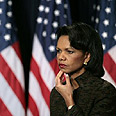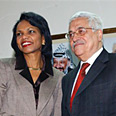

Rice: Israel-Palestinian peace won't help Iraq
US Secretary of State says Bush administration disagrees with Baker-Hamilton report, does not believe Israeli-Palestinian peace is key to solving conflicts elsewhere. Emphasizes however that new US diplomatic push is expected at upcoming three-way meeting with Olmert, Abbas
WASHINGTON – There is no correlation between efforts to promote negotiations between Israel and the Palestinians and the troubles plaguing the campaign in Iraq, US Secretary of State Condoleezza Rice said on Wednesday.
"I don't wish to suggest that we think if we do that (resolve the Israeli-Palestinian conflict), we're going to get something for it in some other part of the diplomacy," Rice said.
Speaking before the House Foreign Relations Committee, Rice stated that after the last war in Lebanon, President George W. Bush's administration believes that promoting solutions for Middle East conflicts, from Lebanon to Iraq, is important.
The much-discussed Baker-Hamilton Iraq Study Group report recommends that Washington advance the Israeli-Palestinian peace process as a precursor to stabilizing the situation in Iraq.
Secretary Rice clarified that Bush's administration does not share these views, but that regardless of this difference of opinions it plans to launch a fresh diplomatic operation aimed at reinvigorating the peace process.
This move will commence with the anticipated three-way meeting between Rice, Prime Minister Ehud Olmert and Palestinian President Mahmoud Abbas, currently scheduled to take place on February 19.
'Offer two-states as alternative to Hamas policies'
Rice said she was optimistic about the upcoming meeting, saying she believed progress was achievable. Rice noted that former PM Ariel Sharon supported the two-state solution, as does the majority of the Israeli public.
She said she believed President Abbas was "very devoted to the two-state solution, to the renunciation of violence, to living side by side with Israel." Abbas wields the kind of authority necessary to engage in negotiations with Israel, she said.
The three would most likely go over the Road Map during the meeting, said Rice, and see what can be done for now to reveal to Palestinians their range of options.
By doing so, she said, Abbas can go to the Palestinian public and put forth the two-state solution as an alternative to a policy of terrorism and a refusal to recognize Israel. "I fully believe that the Palestinian people, the great majority of them, want a better life. They want a peaceful life. And they recognize that they'll have to live side by side with Israel in order to do that," she said.
Rice also noted that the representatives would discuss what an autonomous Palestinian state would In effect look like. "There are elements that we simply never talk about, like Palestinian capacity to govern a state. That's an extremely important part of this discussion," Rice noted.
'Iran funds both Hizbullah, Iraqi death squads'
Rice reiterated the administration's official position on possible military action in Iran, saying that the United States had no intention of attacking Iran. She noted, however, that Iran was the primary sponsor of both Hizbullah and the armed insurgents in Iraq.Rice also addressed concerns regarding Iran's nuclear intentions, saying that the US was not alone in its concerns over Iran's nuclear program.
Rice emphasized that the decision to send a second naval carrier to the Persian Gulf was strictly a protective measure, meant to demonstrate the United States' determination to defend its own and its allies' interests.















